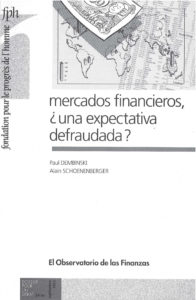Financial Markets: Mission impossible?, Paul Dembinski and Alain Schoenenberger, Charles-Léopold Mayer Foundation for Human Progress, Paris and Lausanne, 1993.

There is no universal, unchanging answer to the question ‘Financial markets – mission impossible?’, which was asked by Professor Maurice Cosandey back in 1991. Indeed, if our enquiry is to be relevant, it must take full account of the experiences of financial markets all over the world. From this point of view, we can now divide the countries of the world into four basic groups: OECD countries, ‘emerging markets’, ‘emerging market economies’ (i.e. post-Communist countries) and the rest of the world. Accordingly, our original question can now be rephrased as follows: ‘What are the roles of financial markets, and what kinds of financial markets can fulfil these roles?’.
CONTENTS
Synthesis by way of introduction
1. The approach
2. The findings
3. The stakes
4. First steps towards meeting the challenge
PART I : Globalization of financial markets
1.1. Foreword
1.2. Globalization of the financial system
1.3. Innovations in financial products
1.4. Bank-oriented and market-oriented systems
1.5. The macroeconomic role of financial markets
1.6. The size of the financial sector
1.7. Stock markets and the business cycle
1.8. Discrimination against small and medium-sized enterprises
1.9. Regulation and financial markets
1.10. The role of financial markets in development and transition
PARTIE II : Financial market and productive investment
2.1. Foreword
2.2. The investment dilemma
2.3. Share prices and growth : a parting of ways ?
2.4. Stock-market concentration
2.5. The contribution of listed companies to GDP
2.6. Financial markets and productive investment
2.7. How companies are financed ?
2.8. The purpose of stock markets : managing wealth or allocating resources?
PARTIE III : The role of financial markets in development and transition
3.1. Foreword
3.2. Emerging financial markets
3.3. Local stock markets and development – a questionable contribution
3.4. Portfolio investment in emerging stock markets – a blessing or a burden?
3.5. The contribution made by OECD stock markets to direct investment
3.6. The stock exchange in transition: the experience of Warsaw
Marchés financiers : une vocation trahie?, Paul Dembinski et Alain Schoenenberger, Fondation pour le Progrès de l’homme, diff. Interfaces-VPC, 1993.

La question posée en 1991 par le professeur Maurice Cosandey « Les marchés financiers : une vocation trahie ? » ne saurait recevoir de réponse unique, invariable dans le temps et dans l’espace. Au contraire, la démarche, pour rester pertinente, doit s’enrichir de l’expérience des marchés financiers sous toutes les latitudes. De ce point de vue, quatre groupes de pays se dessinent clairement aujourd’hui : les pays de l’OCDE, les « marchés émergents », les « économies de marché émergentes » (les pays post-communistes) et le reste du monde. A la lumière de ces observations, la question initiale devient plus nuancée : « Quels marchés financiers pour quelle vocation ? ».
TABLE DES MATIERES
Synthèse en guise d’introduction
1. La démarche
2. Les constats
3. Les enjeux
4. Relever les défis : un début
PARTIE I : Globalisation des marchés financiers
1.1. Introduction
1.2. Globalisation du système financier
1.3. Innovations sur les marchés financiers
1.4. Economie d’endettement et économie de marché financier
1.5. Le rôle macro-économique des marchés financiers
1.6. La taille du secteur financier
1.7. Bourse et conjoncture
1.8. Discrimination à Pencontre des PME
1.9. Marchés financiers et réglementation
1.10. Les marchés financiers dans le développement et la transition
PARTIE II : Marché financier et investissement productif
2.1. Introduction
2.2. Les termes du dilemme
2.3. Les cours et la croissance : le divorce ?
2.4. Concentration sur les marchés boursiers
2.5. Contribution au PNB des entreprises cotées
2.6. Investissement tangible et intangible
2.7. Comment les entreprises se financent-elles
2.8. La bourse : gestion du patrimoine ou allocation des ressources
PARTIE III : Marchés financiers dans le développement et la transition
3.1. Introduction
3.2. Les marchés financiers émergents
33. Bourses locales et développement : un apport controversé
3.4. L’investissement en portefeuille sur les bourses émergentes : bienfait ou perturbation?
3.5. Contribution des bourses de l’OCDE à l’investissement direct
3.6. La bourse dans la transition : l’expérience de Varsovie

